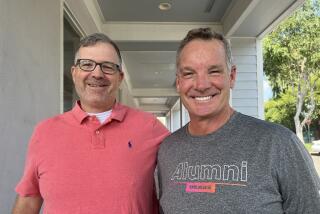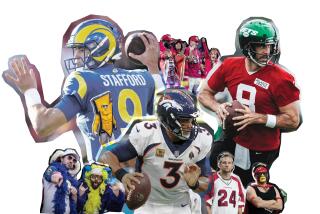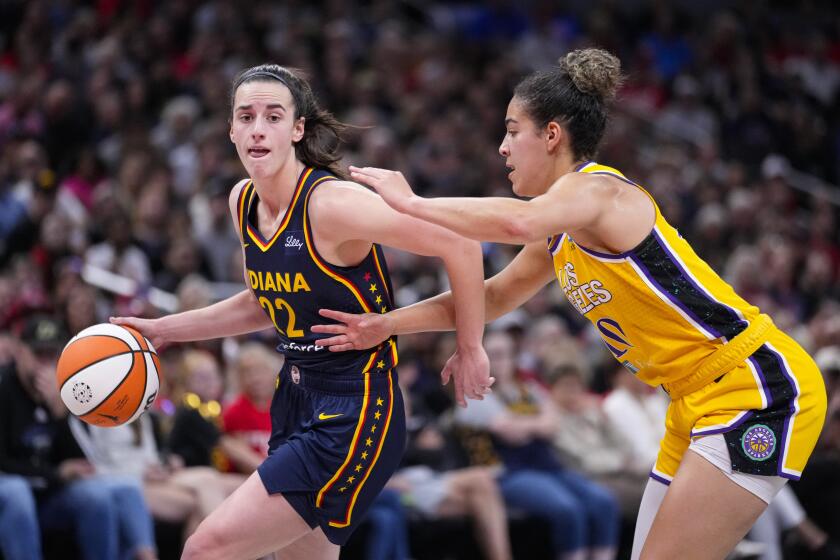Triumph Over Tragedy Is Warners’ Recurring Theme
Kurt Warner was a nobody, a backup quarterback, clinging precariously to life in the NFL. He and his wife, Brenda, sat in a square apartment with dingy shag carpeting and drapes thick with the dust of 100 previous occupants.
Warner was part of a newspaper story. But the story wasn’t about him. It was about his adopted 10-year-old son, Zack, Brenda’s son from a previous marriage, a little boy with a serious brain injury.
There were tears and laughter as the story was told and the point was that simply because Warner was an NFL football player, he was not immune to bad things in life. His neighbors in their suburban apartment complex didn’t know Kurt and Brenda as anything other than a young couple struggling to find the best education possible for a handicapped but lovable little boy.
The NFL playoffs had already started. Warner, who had just finished his first NFL season with the sad-sack St. Louis Rams, was joking about how so many people confused him with Curt Warner, a one-time standout running back for Penn State and the Seattle Seahawks.
“I don’t get it, though,” Warner said. “Curt must be 10 or 15 years older than me. I’ve never met him, but he’s a lot more famous than me.”
Kurt and Brenda had chosen this apartment in Creve Coeur, an upscale St. Louis suburb, because of Zack. Maybe they could have afforded a small house or a little condo in a less-affluent city, but Brenda was fierce in her desire to get Zack in the best school system possible.
The story Kurt and Brenda told was heartbreaking and triumphant. When Zack was 3 1/2 months old, he had accidentally slipped from his birth father’s hands and landed on his head in the bathtub. Brenda and her husband were told that the baby had suffered traumatic brain injuries and probably would not live through the night. And if Zack did live, Brenda was told, her son would be profoundly brain-damaged and most likely unable to live anything resembling a normal life.
The little boy did live. And although his brain had been badly damaged--he is nearly blind and his motor skills are retarded--Zack is also a happy and loved child. His father eventually divorced Brenda, unable, she said, to deal with his guilt over Zack’s injuries.
One day, years later, Brenda met Kurt at a country-western club in Iowa. They line-danced. They fell in love. They married and Kurt adopted Brenda’s kids, Zack and his sister, Jesse.
Brenda, a tiny woman with an easy laugh and a talk-till-she-drops speech pattern, explained Zack’s fight to learn to feed himself. She talked about Kurt’s fight too.
About how he had fought his way from being a one-year starting quarterback at Northern Iowa to a job as a grocery bagger to the Arena League to NFL Europe to finally becoming a dirt-cheap, virtually unknown bench warmer on an absolutely terrible team. And being thrilled to death.
Nothing in his life had ever awed him, Kurt said, until he saw Zack, almost totally blind, eagerly embracing the new computer with the giant print, print big enough for Zack to read; or saw Zack feed himself dinner, even if it took an hour; or watched Zack button his shirt, even if it took two hours.
Brenda explained how she fought hard and sometimes loudly to get everything Zack deserved from the school system. She and Kurt were sacrificing to live in this unattractive apartment and no one was going to deny Zack anything.
Kurt and Brenda laughed about how some of Kurt’s friends had warned him about Brenda, she being four years older than he, divorced and with two kids. A husband-hunting desperado, that’s how Brenda was characterized. But when Kurt looked at Brenda and smiled, or when he touched a picture of Zack and said he admired no one in the world more than Zack, it was clear. Kurt had gained as much as Zack.
Kurt and Brenda talked about how blessed they felt to have found each other. They had a new baby, Kade. Another blessing. It had taken years of rejection and hard work, but Kurt had made it to the NFL. If he never started a game, Kurt was an NFL player. A big blessing.
It was Brenda’s Christianity, Kurt said, that had attracted him to her. It was her Christianity, Brenda said, that had helped her deal with Zack’s accident and with the death of her parents four years later in an Arkansas tornado.
These were sweet young people who expected to be given nothing and it was hard to walk away from the little apartment and not hope that life would be good for Kurt, that he would stick with the Rams and hang onto his spot as backup quarterback.
Kurt has hung on.
A year later he is the NFL’s most valuable player. The Rams are the hit of a most curious NFL season. Brenda gets TV time. She wriggles in her seat, unable to stay still. Kurt shows up on David Letterman’s late-night show, a total natural, joking with the host, then going outside in a windy, cold rainstorm to throw footballs into a wood chipper. Warner giggles when the balls are spit out, shredded. The audience roars.
If high-priced quarterback Trent Green hadn’t been badly hurt late in the exhibition season, so late that the Rams didn’t have time to hunt down a proven quarterback, Kurt never would have gotten this chance. But the chance was presented and Kurt has seized it and twirled it on his arm, same as he did Brenda in that country-western club.
Nobody confuses Kurt Warner with Curt Warner anymore. Big raises are in Kurt’s future. Brenda had wished last January that money were not an issue and that she could go hire the best tutors possible for Zack. Brenda had also said last January, as she spoke about the loss of her parents and about Zack’s injury, that she had never lost her faith in God.
“He works in mysterious ways,” Brenda had said.
Amen. That’s all you can say now when you see Kurt Warner, NFL MVP.
*
Diane Pucin can be reached at her e-mail address: diane.pucin@latimes.com.
More to Read
Go beyond the scoreboard
Get the latest on L.A.'s teams in the daily Sports Report newsletter.
You may occasionally receive promotional content from the Los Angeles Times.










